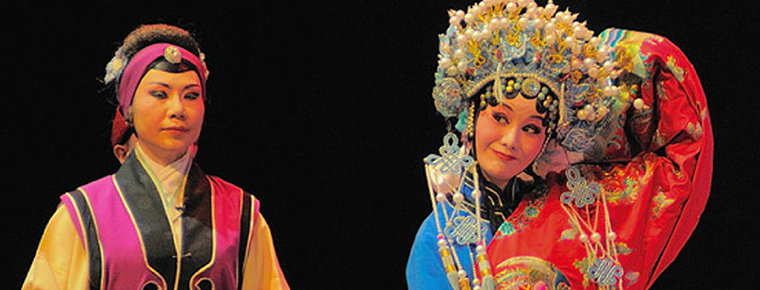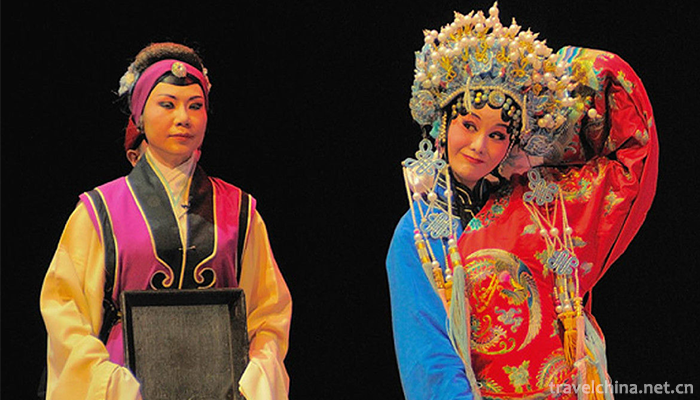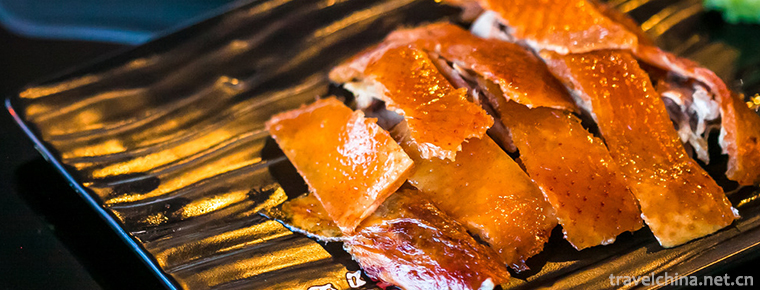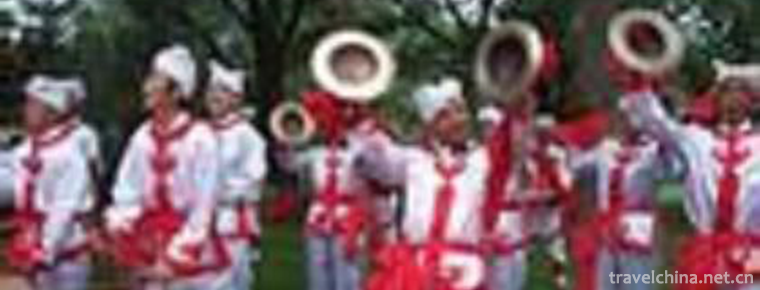2018-10-27

- By ChinaWiki.net
- Chinese Edition
- 2019-04-18
Chu opera
Chu Opera, a local traditional drama in Hubei Province, is one of the national intangible cultural heritage.
Chu opera used to be called "oh-ha-qiang opera", "Huang Xiaohua-gu opera" and "Xilu Huagu opera". During the Daoguang period of the Qing Dynasty, the popular Ooh tune in eastern Hubei merged with the folk songs, Tao sentiments, bamboo horses, stilts and folk rap in the area of Huangpi and Xiaogan, forming an independent local opera, which was renamed Chu Opera in 1926. Mainly popular in Wuhan, Xiaogan, Huanggang, Jingzhou, Chengning, Yichang, Huangshi seven cities more than 40 counties. The tone of Chu Opera is divided into three parts: Banqiang, Xiaodiao and Gaoqiang. Its theme is extensive, easy to understand and has a strong local flavor.
On May 20, 2006, Chu Opera was approved by the State Council of the People's Republic of China to be included in the first batch of national intangible cultural heritage catalogues, the number of which is IV-58.
historical origin
In the early stage of the formation of Chu Opera, it was only sung when playing lanterns on the Lantern Festival in the countryside, so it was also commonly known as "lantern opera". Later, Maihuang Ban performed in the leisure time in the countryside and the four-season class performed all the year round appeared gradually. The earliest Chu Opera troupe was two troupes organized by Aijiudai and Zhang Mian in the Guangxu period. At that time, there were only seven or eight troupes, with few singing tunes and few regular performances: In 1900, the troupes performing in the countryside began to enter Shakou and Shuikou towns near Hankou. They sang in the tea garden. Two years later (1902), the troupes first entered the Qingzheng Tea Garden in the Hankoude Concession, creating the history of Chu Opera performing in the city. After the 1911 Revolution, the theatres began to appear in the concession.
In the 1920s, Chu Opera gradually accepted the influence of Beijing Opera, Han Opera and Civilized Opera. Actors and musicians began to have a division of labor. They created tunes such as playing tunes and starting tunes in their singing. The repertoire began to turn out to be only operas. Some props of Beijing Opera and Han Opera were used. In 1923, with the efforts of famous actors such as Tao Zhanpeng, Xiaobing Yan and Shen Yunhao, Chu Opera was changed from Ren Lubang Tune. Accompanied by Huqin, it had a far-reaching impact on the development of Gong opera series: since then, Chu opera's popularity has expanded rapidly and become one of the representative operas in Hubei Province.
In 1926, the Northern Expeditionary Army conquered Wuhan. In the name of "Chu Opera Evolution Society", the confused Chu Opera joined the Hubei Opera Society. It was officially named Chu Opera. It was recruited to perform in the blossom world led by Li Zhilong, a member of the Communist Party, and gained the legitimate status of public performance outside the concession. With the help and promotion of Li Zhilong, Tao Gupeng and Wang Ruoyu, it improved its performance. Great achievements have been made in staff quality, drama quality, social activities, artists'unity and artistic reform. After the founding of New China, Chu Opera has been unprecedented prosperity and development, a series of professional troupes have been established, Chu Opera has entered a new stage of development.
artistic characteristics
Music for voices in a Chinese Opera
There are many singing tunes in Chu Opera, such as playful tune, tragic tune, fairy tune, Chengshan tune, Siping, Shizhimei, etc. The rhythm of Xipi tune is flexible and changeable. It can be narrated, lyrical, widely used and expressive. The tragic tune is only female tune, which is the alternating tune of Gong Zheng. Its tune is sad and melancholy, and it is good at expressing sad and desolate feelings. The immortal tune is the alternating withering tune of Zheng Zheng, which is either euphemistic or melancholy, or intense and unrestrained. It is good at expressing angry and angry mood. Yingshan tune, originally a tune of Huagu in Beilu, has become one of the main tunes of Chu Opera. Its tune is lively, fresh, sweet and smooth. The melody is bright and gorgeous, and is good at expressing happy and joyful mood. Its derivative Xipi Siping melody is gorgeous and graceful, suitable for fairies, princesses and noble female roles. Shizhimei was originally the special melody of Tianzhao Huagu opera "one-sided words", "Shizhimei", which later became a part of the singing tune of Chu opera. Its melody is happy and soft, and is good at expressing happy or worried mood.
Accompaniment instrument
The accompaniment instruments of Chu Opera mainly include Huqin, Beijing Erhu, Erhu, Sanxian, Bangu, cymbals, big and small gongs, etc.
Foot color
The roles of Chu Opera are mainly divided into three categories: Sheng, Dan and Ugly, and the other actors are Sheng, Dan and Ugly.
Draw materials
Chu opera has a wide range of materials, easy to understand, lively, strong local flavor, very inclusive. It has absorbed the repertoire of Beijing and Han operas. It can not only perform small life operas, modern operas, but also palace operas and martial arts operas, with a variety of means of expression.
Representative repertoire
There are about 500 existing plays in Chu Opera, and there are more than 200 performances. Among them, the more important ones are "Qin Xuemei hanging filial piety", "Yinping Princess", "Chai Zhai", "Killing Dog and Startling Wife", "Three Aggressions", "Wuhan Killing Wife", "Cai Mingfeng Cidian", "Gema", "Hundred Days Margin", "Nine Clothes", "Wujin Ji", "Selling Cotton Yarn", "Dumb Lawsuit", "White Fan". Records, Si Fan, Lai Marriage, Jishui, Dong Yong Selling, etc.
Inheritance and protection
Inheritance value
Chu Opera is close to life, closely following the times, with rich and diverse means of expression and strong inclusiveness, fully demonstrating the characteristics of local culture in eastern Hubei.
Inheritance status
Chu Opera is facing many difficulties, such as dramatic reduction of troupes, aging personnel, economic difficulties, lack of successors, shrinking audiences and so on. The rescue of precious materials and the skills of older generations of artists is also difficult to carry out due to lack of funds. It is urgent for relevant parties to care and support.
Inheriting characters
Xiong Jianxiao, male, Han nationality, born in Wuhan, Hubei Province in 1922. In 2008, the second batch of national intangible cultural heritage projects were selected as representative successors of Chu Opera and state-level actors.
Zhang Guangming, female, Han nationality, born in March 1946, now lives in Wuhan, Hubei Province. In December 2012, he was selected as the representative successor of Chu Opera in the fourth batch of national intangible cultural heritage projects.
Rong Mingxiang, male, Han nationality, born in December 1939 in Huangpi District, Wuhan City, Hubei Province. In December 2012, he was selected as the representative successor of Chu Opera in the fourth batch of national intangible cultural heritage projects.
protective measures
In 2013, Xiaogan Chu Opera Show was qualified for the establishment of the second batch of national public cultural service system demonstration projects, which brought new opportunities for the development of Chu Opera Troupes in Xiaogan City.
In January 2015, the General Office of the Central Committee of the Communist Party of China and the General Office of the State Council issued Opinions on Accelerating the Construction of a Modern Public Cultural Service System. In May, the General Office of the State Council forwarded the Opinions on the Government's Purchasing Public Cultural Services from Social Forces drafted by the Ministry of Culture and other four ministries. In July, the General Office of the State Council issued the Opinions on Supporting the Inheritance and Development of Traditional Opera. This is a dramatic policy which can cause dramatic changes in the development of opera after the Directive on the Reform of Opera signed and issued by Premier Zhou Enlai in May 1951.
social influence
Honorary commendation
In May 1991, "Tiger" drama participated in the national modern theatre performance held in Yangzhou, and won 7 prizes in 12 prizes, namely, excellent repertoire award, excellent screenwriter award, excellent director award, excellent performance award, excellent music instrument award, excellent costume design award and excellent young actor award.
In June 1991, the drama "Tiger" entered Beijing for the second time, giving a performance for the 70th anniversary of the founding of the Party. It was once again successful and received personally by Li Xiannian, then Chairman of the CPPCC National Committee.
On September 26, 1991, the first National "Wenhua Award" awarding ceremony held by the Ministry of Culture was solemnly held in the Great Hall of the People. Guangshui Chu Opera Troupe "General Tiger" was awarded four awards, ranking first; General Tiger was awarded Wenhua New Drama Award; scriptwriter Song Xiting was awarded Wenhua Drama Award; director Yu Xiaoying was awarded Wenhua Director Award; actor Zhang Taiping was awarded Wenhua Performance Award. 。
Important performance
In early November 2018, at the invitation of the University of Aberdeen, the Chu Opera Troupe was invited to go to Britain to perform the Chu Opera "The Story of the Horse".
Since mid-September 2018, Chu Opera Troupe of Xinzhou District "Thousand Schools, Thousands of Opera" has entered the campus for activities in primary and secondary schools of Xugu Street.

Ask a Question
Your email address will not be published.



0 Questions